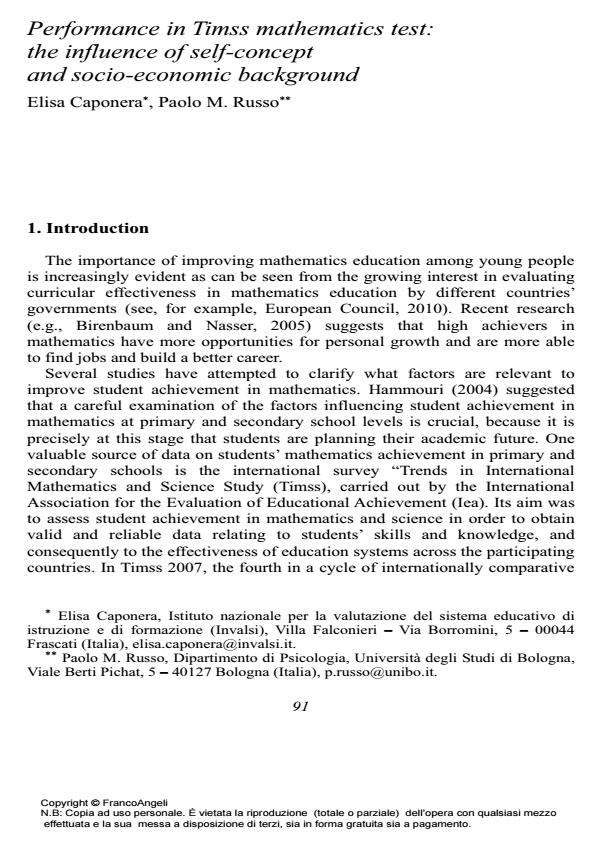Performance in Timss mathematics test: the influence of self-concept and socio-economic background
Titolo Rivista CADMO
Autori/Curatori Elisa Caponera, Paolo M. Russo
Anno di pubblicazione 2010 Fascicolo 2010/2
Lingua Inglese Numero pagine 13 P. 91-103 Dimensione file 306 KB
DOI 10.3280/CAD2010-002009
Il DOI è il codice a barre della proprietà intellettuale: per saperne di più
clicca qui
Qui sotto puoi vedere in anteprima la prima pagina di questo articolo.
Se questo articolo ti interessa, lo puoi acquistare (e scaricare in formato pdf) seguendo le facili indicazioni per acquistare il download credit. Acquista Download Credits per scaricare questo Articolo in formato PDF

FrancoAngeli è membro della Publishers International Linking Association, Inc (PILA), associazione indipendente e non profit per facilitare (attraverso i servizi tecnologici implementati da CrossRef.org) l’accesso degli studiosi ai contenuti digitali nelle pubblicazioni professionali e scientifiche.
The purpose of this study is to evaluate the influence of students’ attitudes towards mathematics, mathematics self-concept and socio-economic status on their performance in Timss mathematics test. It also examined the relevance of the different schools’ characteristics for the prediction of students’ performance. We analyzed data related to 3997 Italian students of 170 schools, a representative sample of students in eight grade school, that participated to the Timss 2007. A multilevel analysis was conducted to distinguish how much of the variability of performance was due to student characteristics and/or to characteristics of schools and of the territorial context in which schools are located. The results showed that self-concept in mathematics helps to explain the differences in performance in mathematics. Further, the socio-economic status, at school level, contributed to the prediction of the performance in mathematics. Furthermore, in the Italian context, significant differences in performance depending on geographic area were evidenced.
Parole chiave:Mathematics achievement, mathematics self-concept, socio-economic status, multilevel regression analysis, Timss
- The influence of reading literacy on mathematics and science achievement Elisa Caponera, Paolo Sestito, Paolo M. Russo, in The Journal of Educational Research /2016 pp.197
DOI: 10.1080/00220671.2014.936998 - Exploring Eighth-Grade Minority and Female Students’ Statistical Literacy Skills Using Timss Jamie D. Mills, Marsha E. Simon, in Middle Grades Research Journal /2016 pp.1
DOI: 10.1108/MGRJ-04-2016-0003 - The development of statistical literacy skills in the eighth grade: exploring the TIMSS data to evaluate student achievement and teacher characteristics in the United States Jamie D. Mills, Charles E. Holloway, in Educational Research and Evaluation /2013 pp.323
DOI: 10.1080/13803611.2013.771110 - Kritická místa v matematice u českých žáků na základě výsledků šetření TIMSS 2007 M. Rendl, N. Vondrová, in Pedagogická orientace /2014 pp.22
DOI: 10.5817/PedOr2014-1-22
Elisa Caponera, Paolo M. Russo, Performance in Timss mathematics test: the influence of self-concept and socio-economic background in "CADMO" 2/2010, pp 91-103, DOI: 10.3280/CAD2010-002009